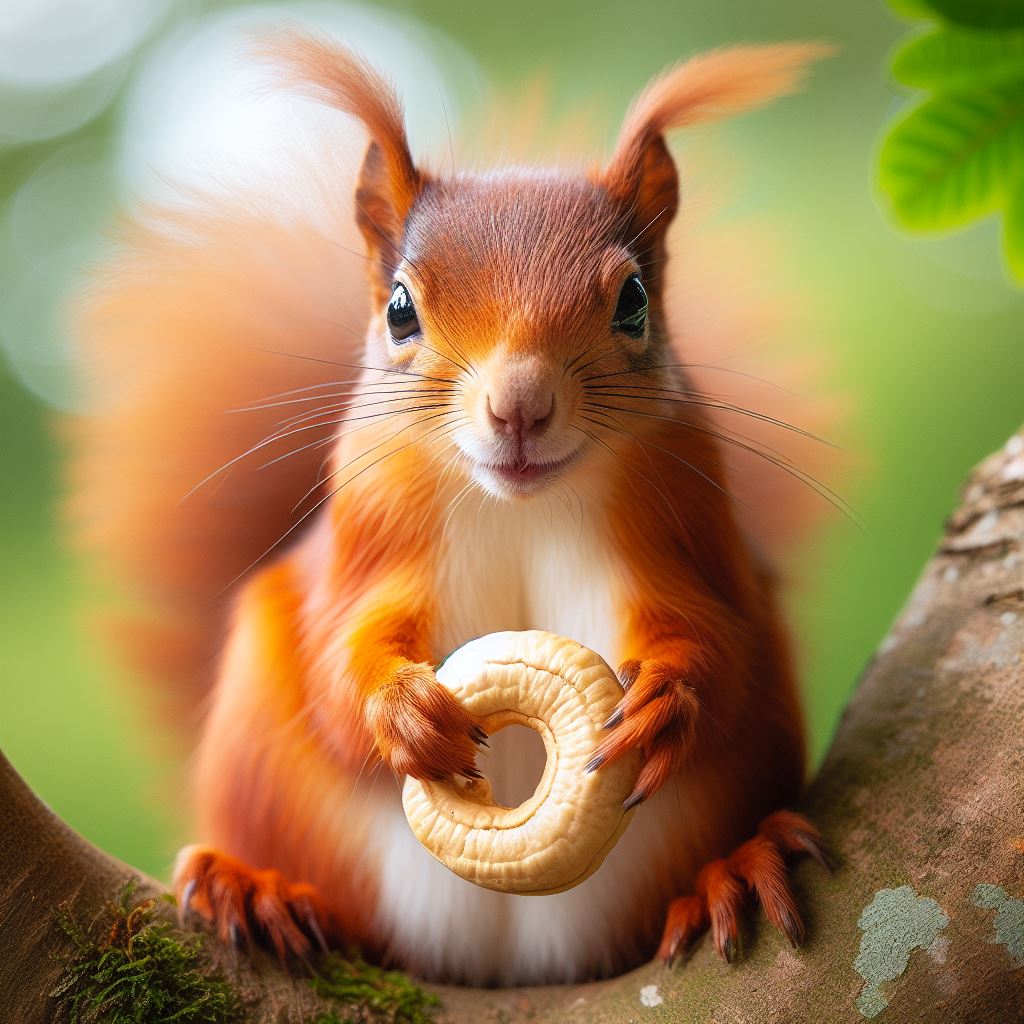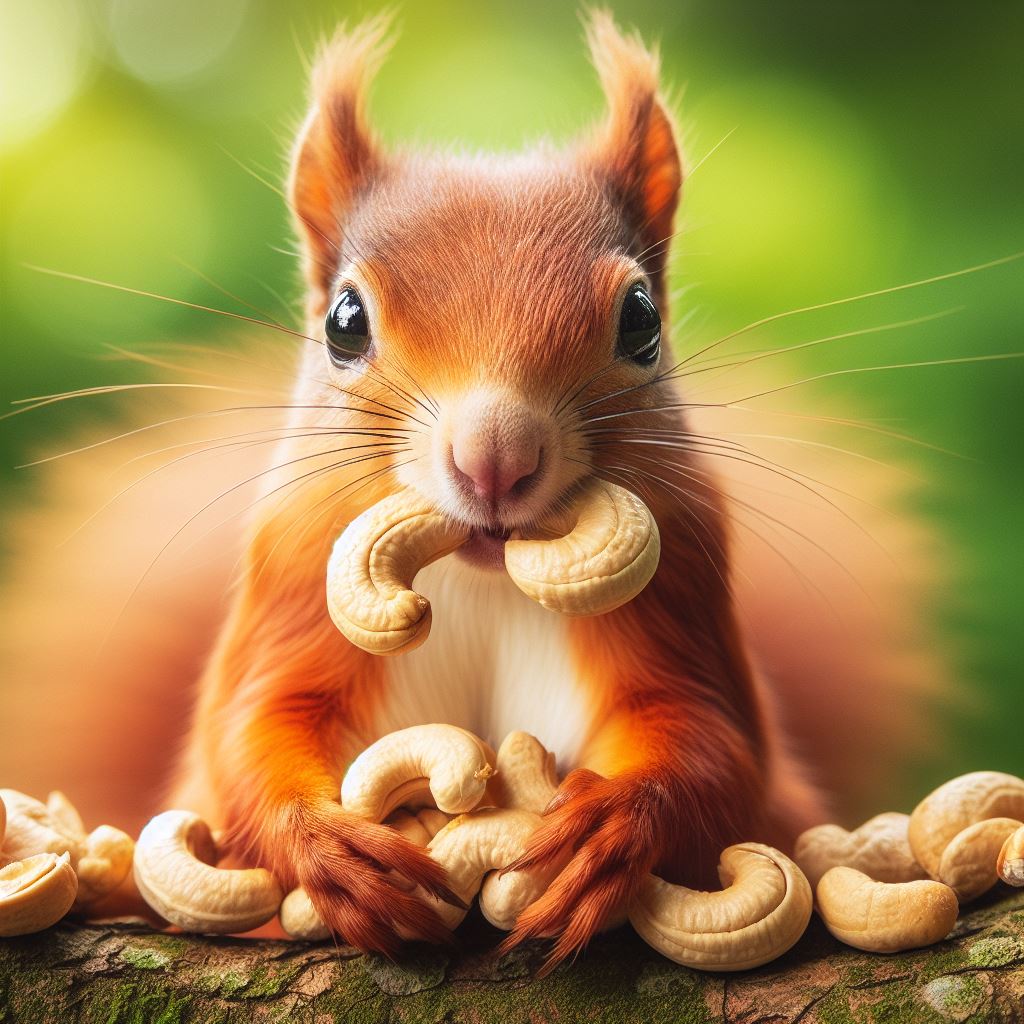No, squirrels should not eat cashews.
As an animal nutrition expert, I do not recommend feeding cashews to squirrels, whether they are wild or kept as pets.
Cashews are high in fat and phosphorus compared to the nutrients squirrels need most, like protein, vitamins, and calcium.
Too much phosphorus can lead to calcium deficiency and bone problems over time.
Squirrels have very specific dietary requirements to stay healthy.
While they may enjoy the taste of cashews, these nuts do not provide proper nutrition.
Instead of cashews, better options to feed squirrels include rodent food blocks for pets or more natural foods like acorns, tree nuts, seeds, fruits, and vegetables for wild squirrels.
Providing a balanced variety of foods gives them the nutrients they need.
Occasionally feeding one or two unseasoned cashews likely won’t harm a squirrel, but they should not make up any regular part of its diet.
I do not recommend making cashews a regular part of any squirrel’s diet.
To learn more about proper squirrel nutrition and foods that meet their needs, keep reading this article below for further details.

- What specific nutrients in cashews are harmful or beneficial to squirrels?
- How much fat and phosphorus is too much for a squirrel’s diet?
- Do different types of squirrels have different tolerances for foods like cashews?
- What symptoms or health problems can develop if squirrels eat too many cashews?
- Are cashews more or less healthy for captive versus wild squirrels?
This distinguishes whether habitat factors play a role in determining how suitable cashews are in a squirrel’s diet.
- What other nuts or seeds make good alternatives to cashews for squirrels?
- Helping Resources:
What specific nutrients in cashews are harmful or beneficial to squirrels?
Cashews contain beneficial nutrients like protein, healthy fats, vitamins, and minerals that can be part of a balanced diet for squirrels.
However, they are high in fat and should only be fed in moderation to avoid weight gain or other health issues.Specifically, the beneficial nutrients in cashews for squirrels include:- Protein – Squirrels are omnivores and need protein from sources like nuts and seeds.Cashews provide protein to help squirrels maintain muscle mass.
- Vitamin B6 – Cashews are high in vitamin B6 which aids squirrel digestion and metabolism.
- Minerals like magnesium, calcium, and zinc – These minerals support bone health, immune function, and other vital processes in squirrels.
However, cashews also contain:
- High amounts of fat and calories – Too many cashews can lead to obesity and related health problems in squirrels.Their high fat content makes them more of a treat than a dietary staple.
- Excess salt, if salted – Salted nuts dehydrate squirrels and harm their kidneys.Only unsalted nuts should be fed.
- Unbalanced calcium to phosphorus ratios – The imbalance between these minerals impairs squirrels’ ability to properly utilize calcium.
So in moderation, the beneficial protein, vitamins and minerals in cashews can complement the rest of a squirrel’s diet.
But overfeeding them replaces balanced nutrition, which long-term leads to health issues.
Monitoring cashew intake and offering a nutritious mix of foods is key to keeping squirrel companions healthy.
How much fat and phosphorus is too much for a squirrel’s diet?
I can provide some guidance on safe fat and phosphorus levels for squirrels.In general, squirrels should get no more than 30-40% of their total caloric intake from fat.
Consuming too much fat can lead to obesity and other health issues in squirrels over time.
As for phosphorus, there is less concrete data but it is believed that excessive phosphorus can disrupt calcium absorption and bone health.
I would advise keeping phosphorus below 0.6% of total dry matter intake as a conservative threshold.When it comes to cashews specifically, they are relatively high in both fat and phosphorus compared to typical squirrel foods like nuts, seeds, fruits.
About 50% of cashew calories come from fat and cashews contain roughly 1% phosphorus by weight.
This means that if a large part of a squirrel’s diet, say over 25%, comes from cashews they could potentially start approaching unhealthy levels for normal squirrel physiology.
Smaller amounts are likely fine as an occasional treat.
But generally I would recommend limiting high-fat and high-phosphorus foods like cashews in squirrel diets.
Do different types of squirrels have different tolerances for foods like cashews?
Different squirrel species do show variation in their ability to process and utilize fatty, phosphorus-rich foods like cashews.
I can provide some key insights on this topic.In brief, urban red squirrels have been found to have a weaker metabolic response to temperature changes compared to rural red squirrels, suggesting an adaptation that may allow them to better utilize calorie-dense foods.
Arctic ground squirrels increase their body temperature and metabolic rate when fed diets high in omega-3 fatty acids, indicating a tolerance for fatty foods.
Fox squirrels are documented to favor fatty foods for their high calorie content to support their energy needs.
However, I did not find direct research comparing cashew tolerance across squirrel species.Looking more closely at the available evidence, the urban red squirrels study suggests city-dwelling squirrels may have adapted a dampened metabolic flexibility to take advantage of calorie-dense anthropogenic foods.
The arctic ground squirrel research specifically shows they can harness dietary fatty acids to raise body temperature, which would confer winter survival advantages.
Fox squirrels actively seek out fatty foods across their range, though with some geographic preferences – for example, favoring pecans and acorns in certain regions.Taken together, different squirrel species likely vary in their physiological tolerance and behavioral preference for fatty food sources like cashews.
Comparing such tolerance directly across species like fox squirrels, urban red squirrels, and arctic ground squirrels would be an interesting area for further research.
What symptoms or health problems can develop if squirrels eat too many cashews?
Excessive cashew consumption can lead to several health issues in squirrels.
To start, eating too many cashews could cause obesity due to the high fat content.
Obesity puts extra stress on bones and joints, potentially leading to diseases like arthritis or osteoporosis over time.
Additionally, the high phosphorus levels in cashews can inhibit calcium absorption.
Calcium deficiency causes bone diseases as the body pulls calcium from bones to maintain blood calcium levels.
This loss of calcium from the bones leads to conditions like rickets or osteoma Lacia.
Finally, raw cashews contain urushiol, an oil that can cause skin rashes or severe allergic reactions.
While roasted cashews are safe, raw cashews could irritate a squirrel’s skin or respiratory system.

Are cashews more or less healthy for captive versus wild squirrels?This distinguishes whether habitat factors play a role in determining how suitable cashews are in a squirrel’s diet.
Here’s a table outlining some key points for comparison:
| Aspect | Captive Squirrels | Wild Squirrels |
|---|---|---|
| Nutritional Content | Captive squirrels may have a more consistent diet, so the nutritional content of cashews can be more easily monitored. | Wild squirrels may have a more varied diet, so the nutritional impact of cashews may be less significant. |
| Availability | Cashews are readily available in captivity and can be provided as part of a controlled diet. | In the wild, cashews may not be a natural part of the squirrels’ diet and their availability can be limited. |
| Impact on Behavior | Cashews provided in captivity may affect the foraging and feeding behavior of squirrels. | Wild squirrels may need to spend more time and energy foraging for cashews, potentially impacting their natural behavior. |
it’s important to consider the potential differences in the impact of cashews on captive and wild squirrels.
This information can help in understanding how habitat factors may influence the suitability of cashews in a squirrel’s diet.
What other nuts or seeds make good alternatives to cashews for squirrels?
I recommend providing squirrels with a variety of nuts and seeds to ensure a balanced diet.
In addition to cashews, which should be given in moderation, other safe options include walnuts, hickory nuts, white oak acorns, beechnuts, pecans, whole roasted pumpkin seeds, and pistachios.
These nuts are beneficial for squirrels as they provide healthy nutrients and fatty proteins, and the shells also help with their dental health by allowing them to gnaw and exercise their jaw muscles.
It’s important to avoid feeding squirrels peanuts, as they can contain a fungus that is harmful to them, and to provide in-the-shell nuts to promote natural foraging and gnawing behavior, which is vital for their dental care.
For a more cost-effective alternative to cashews, you can consider providing black oil sunflower seeds and nut-based blends, which are also popular choices for squirrels and can serve as a backup energy source when in-the-shell nuts are not available. By offering a variety of nuts and seeds, you can help support the health and natural behaviors of the squirrels in your area, while also providing an engaging and enriching feeding experience for these fascinating creatures.
Helping Resources:
[1]https://www.reddit.com/r/squirrels/comments/hem8id/gave_squirrel_cashews_will_it_die/
[2] https://squirrelenthusiast.com/can-squirrels-eat-cashews/
[3] https://www.amazon.com/SQUIRREL-BRAND-Artisan-Butter-Cashews/dp/B07BQXJ123
[4] https://www.magicbavariannuts.com/products/combo-cashews-20oz-squirrel
[5] https://www.squirrelbrand.com/products/brazilian-cashews-coated-in-rich-golden-milk